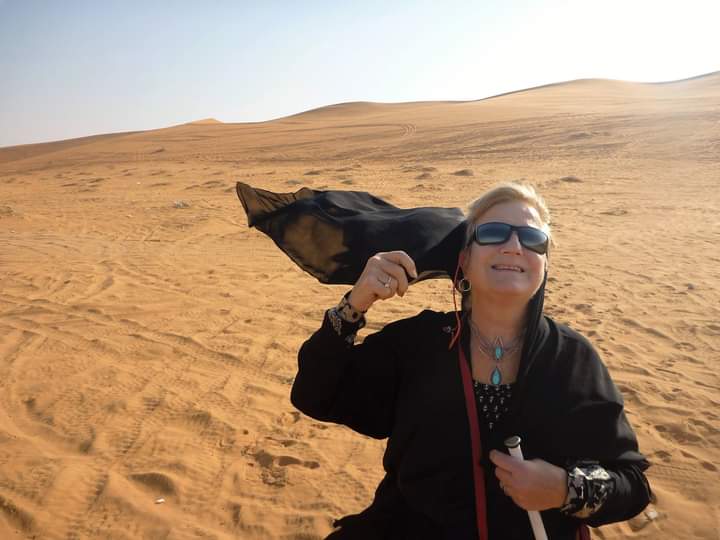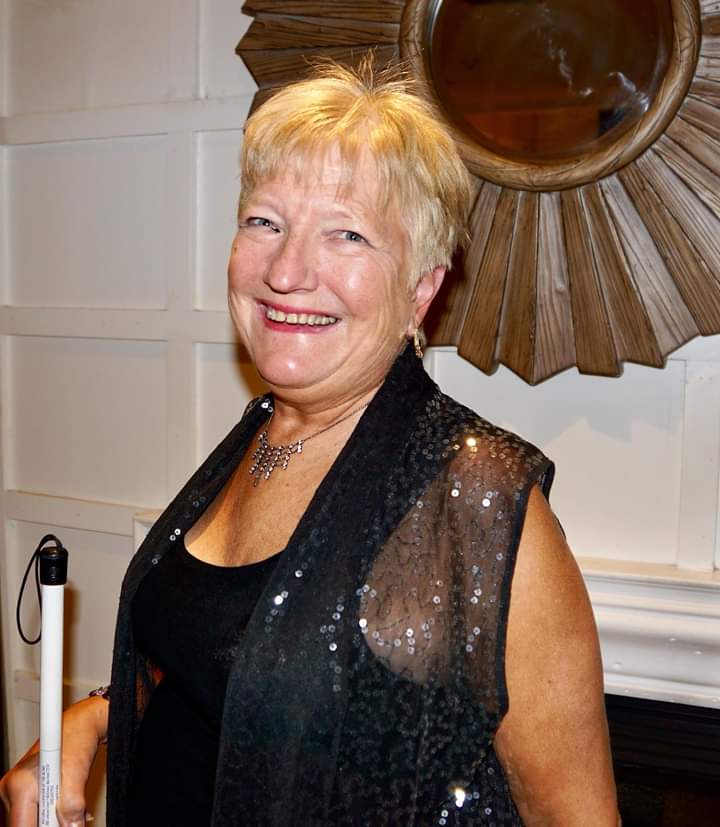
by guest blogger Annemarie Cooke
You – or someone you care about – are older, and having trouble reading print. The simple act of scanning a printed page visually is now laborious and slow-going. It’s time to get that checked out with the eye doctor.
After running some tests, the doctor’s declaration is all-too-familiar and goes something like this: “You have age-related macular degeneration, which is the #1 cause of vision loss in people over 60 in the U.S. THERE’S NOTHING I CAN DO. I AM SORRY.”
Your heart sinks, the floor figuratively falls out from beneath you. Rage, sorrow, grief…all those stages described by Kubler-Ross run through your mind, seemingly at once.
Blindness is one of the lowest-incidence disabilities in the general population, so it’s likely you may not know or have never met a blind person. That doctor must be right; there’s no magic pill or surgery to fix you. Depending on the kind of eye condition you have there may be vitamin therapy or periodic injections into the eye to stave off the loss of more vision. It’s likely, though, that what you have lost will remain so.
Before we continue here, a disclaimer: I am not a medical professional and this blog is not intended to dispense medical advice. Know, however, that I have been part of the scenario just described and have personally spent too many years being angry at my diagnosis of juvenile macular degeneration. My hope is that my experience may save you lots of time in the adjustment process. And while you might have been told there is nothing to be done, that is not entirely true.
Disability Perception
There are two commonly-held ways that disability (such as blindness) is perceived. One is the medical model: Your vision is diminishing and that eye doc cannot bring it back. That may be the case. Therefore, in some circles, you and your condition represent failure to a medical professional who has been trained to “fix” what is “wrong” with patients. Your eye condition cannot be brought back to 20/20 or whatever your best vision was. So, in a matter of speaking, there is, technically, nothing that medically or surgically can be done.
There is another way, however, that disability is viewed by those of us who have one (or more). Having a disability is just another way to be – a part of the grand spectrum of human diversity. And a disability needs to be accommodated so that a full life can be had, if that is what the person with a disability wants. Many laws guarantee this, including the 1991 Americans with Disabilities Act, granting equal access to public places, documents and the like as a civil right.
Yes, You Can…
After your diagnosis, the next step is YOUR choice. You CAN have a great life, continue many of the activities that brought you joy and satisfaction before your diagnosis. Your part is the willingness to try a new way to achieve the same ends.
For example, you enjoy reading the daily paper, adore certain magazines and relish best-sellers. What now? You can’t see the print sufficiently to read it fluently and comfortably. Know that the digital age brings with it opportunities to get the same content by downloading them or playing CD audiobooks and periodicals. You also can use assistive technology – software that magnifies and changes on-screen print fonts and colors or reads the screen content aloud. These are just some of the examples of what is possible. Do you love to hike, take bike trips, ski or travel around the world? I’ve done all of that with my diminishing sight.
Yes, you’re going to need some new skills, tools and techniques, not to mention emotional support from other people who already have or are walking the same path as you.
“Legal Blindness”
First, have your doctor tell you if you meet the parameters for “legal blindness” (there is, as far as I know, no illegal blindness!), which is that your best vision, with correction, is 20/200. This means that you see at 20 feet what a person without vision loss sees at 200 feet. (Note that I don’t use the term “normal” here; in my life, normal is just a setting on a washing machine, not a classification of the way anyone sees.)
The other element for the classification of legal blindness is a visual radius of 20 degrees or less. This relates to the radius of what your eye can see.
Most people who meet the criteria for legal blindness do see something. Blindness is a spectrum of the range of one’s functional vision. Only 10 to 15 percent of us blind folks see nothing at all.
NJ Commission for the Blind and Visually Impaired
Legal blindness entitles you to services from your state’s agency dedicated to people who are blind or have low vision. So next, contact the NJ Commission for the Blind and Visually Impaired (CBVI), which serves people throughout the lifespan. There are offices in Newark, Freehold and Cherry Hill. Their website is www.state.nj.us/humanservices/cbvi/. Call them at 973-648-3333 or toll-free at 1-877-685-8878 and arrange for what is known as an “intake interview.” A caseworker will collect the necessary information and determine whether you need training to continue a job you felt you had to leave because of vision loss, or perhaps you need training for a whole new career, or maybe how to live the life you want.
Have no second thoughts about requesting services from CBVI – you pay taxes and this service is absolutely there for us. Once you become a client, you can get aids and appliances of all sorts, FOR FREE, to make your life easier. A rehabilitation teacher may even come to your home (once the pandemic is over) to help label your stove thermostat, washing machine and the like to make them simpler to use by touch rather than sight.
Support Groups
There also are support groups around the state for people experiencing vision loss. Find one local to you by contacting Susan Vanino, the social worker at CBVI who coordinates the program, at 973-648-2821. You can also email susan.vanino@dhs.nj.gov.
Support groups can be so helpful. Their members also are experiencing vision loss and some of the best tricks of the trade, so to speak, come from others who are a few steps ahead on the path. (Many groups continue to meet by conference call, Zoom or similar platforms to keep everyone safe and healthy.)
National Federation of the Blind of NJ
One of the best resources available is the National Federation of the Blind of New Jersey (NFBNJ), part of the National Federation of the Blind based in Baltimore. Check them out at www.nfbnj.org. I proudly serve on their Board. Be sure to look at the Senior Division at www.nfbnj.org/chapters-and-divisions/seniors/. This group meets by phone at 7 p.m. on the third Monday of every month. Annual dues are $5.
The 2020 NFBNJ State Convention, taking place Nov. 18 to 21, is virtual this year, and I highly recommend it. It’s free but you must register in advance at www.nfbnj.org/state-convention/. You’ll hear from engaging and informative speakers and learn about the latest in technology, including Smartphones that read the screen content aloud, dial the phone by voice and even coach you on taking a well-framed photo with its camera.
This brief blog easily could become a book so I will stop here. Remember, whether you are diagnosed with macular degeneration or a similar cause of vision loss, the choice of how you will respond is up to you. Be willing to achieve the same ends by using different means. It really works!
I’m happy to answer any questions or receive your comments about this blog. Please leave them here or if you’d prefer, email them to NJFA Communications Manager Sue Brooks at sbrooks@njfoundationforaging.org. Include your contact information and I’ll reply.
 Annemarie Cooke began losing central vision in early adulthood. She has Stargart’s Maculopathy, a congenital form of macular degeneration. A graduate of Douglass College of Rutgers University, she’s a former award-winning investigative and feature reporter for the Daily Home News (now the Home News Tribune). She later joined Recording for the Blind & Dyslexic (now Learning Ally), where her advocacy work often took her to Washington, D.C. She notes that the advances in assistive technology, combined with the wisdom and fellowship found in several support groups and the National Federation of the Blind of New Jersey, have helped her grow into a confident mentor in a state transition program for blind and visually impaired NJ high school students. Annemarie and her husband are semi-retired and live in a 55+ community in Burlington County, NJ, where she leads a support group for seniors with vision loss.
Annemarie Cooke began losing central vision in early adulthood. She has Stargart’s Maculopathy, a congenital form of macular degeneration. A graduate of Douglass College of Rutgers University, she’s a former award-winning investigative and feature reporter for the Daily Home News (now the Home News Tribune). She later joined Recording for the Blind & Dyslexic (now Learning Ally), where her advocacy work often took her to Washington, D.C. She notes that the advances in assistive technology, combined with the wisdom and fellowship found in several support groups and the National Federation of the Blind of New Jersey, have helped her grow into a confident mentor in a state transition program for blind and visually impaired NJ high school students. Annemarie and her husband are semi-retired and live in a 55+ community in Burlington County, NJ, where she leads a support group for seniors with vision loss.

